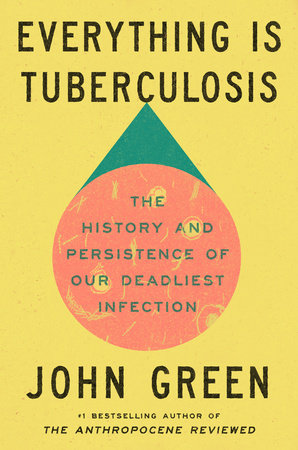» Book Review
Review: Everything Is Tuberculosis by John Green
 Review of: Everything Is Tuberculosis, by John Green; Crash Course Books; $28.00; 208 pages; March 18, 2025
Review of: Everything Is Tuberculosis, by John Green; Crash Course Books; $28.00; 208 pages; March 18, 2025
Review by Jordan Alexander
In January, 2025, the Dr. Phillips Center for the Performing Arts in Orlando, Florida, held “An Evening with Author John Green.” Over the twenty years since the publication of his first book, Looking for Alaska, Green has worn many hats: YA author, YouTuber, essayist, and most recently, tuberculosis (TB) activist. In January, he was promoting his newest book Everything Is Tuberculosis. Over the last few years, Green has shared the history of this notorious disease across his social media platforms, but at his talk, he spoke about the other subject of the book, his friendship with Henry Reider, a TB survivor he met while doing charity work in Sierra Leone. Green recalled his first encounter with Henry at Lakka Government Hospital. Henry, enthusiastic and friendly, guided Green around the hospital. Green assumed that he was the child of the hospital staff, reminded of Green’s then nine-year-old son, who shares the same name. But Henry was not nine; he was seventeen. He was not a child of a staff member, but a patient suffering from drug-resistant tuberculosis. Meeting Henry revealed to Green a global health crisis, one that he spent years researching, resulting in Everything Is Tuberculosis.
Green’s book draws our attention to an issue most people in the West aren’t aware exists. In the United States, we tend to think of tuberculosis as a disease of frail nineteenth century poets, a relic. This is because TB has been curable since the 1950s. Yet, tuberculosis remains humanity’s deadliest disease, “killing around one in seven people who’ve ever lived.” Inadequacies in healthcare, poverty, and predatory pharmaceutical companies inhibit tuberculosis treatment in impoverished countries, especially in the Global South. This is the discrepancy Green discovered when he met Henry, and the discrepancy he illuminates through the book.
Everything Is Tuberculosis is not a medical textbook. There is no sterile, academic language. Green writes in a conversational, welcoming voice reminiscent of a Brian Doyle essay. Readers familiar with Green’s work will recognize this style from his other nonfiction work, The Anthropocene Reviewed. Green’s writings on tuberculosis are also interspersed with his personal stories, rendering the scientific and historical explorations accessible. “Statistics do a lot of work,” Green said in an interview with Scientific American, “but what really moves us is human stories.”
Human stories lie at the heart of Everything Is Tuberculosis. Early in the book, Green introduces Henry in a way that creates an emotional connection between Henry and the reader: “He had some of the mannerisms of my son, the same paradoxical mixture of shyness and enthusiastic desire for connection.” Henry’s story frames the book’s historical dive into tuberculosis. We care about Robert Koch and Romantic poets because we care about Henry, and we want to understand the chain of dominoes that led to his illness.
After Henry’s introduction, Green traces the web of tuberculosis and its connections to everything from World War I to Sherlock Holmes. Green contextualizes Henry’s illness through historical episodes, reminding us of the “omnipresence of history.” Green writes: “Henry was sick not really because of Koch’s bacillus, but because of historical forces, the ones we’ve encountered here . . . His illness was a product of Sierra Leone’s centuries-long impoverishment, of a healthcare system hollowed out by colonization and war and Ebola.” The omnipresence of history looms over the text in the same way it looms over Henry’s life and the lives of tuberculosis sufferers across the globe.
Green also details the history of Sierra Leon, breaking down misconceptions about the Global South before those misconceptions creep up. “There is nothing inevitable or natural about the impoverishment of countries like Sierra Leone,” Green writes. He traces the systemic issues plaguing Sierra Leon to early imperialism and colonization. He doesn’t just describe the inadequate healthcare system in the country; he demonstrates precisely what historical events created those circumstances.
Everything Is Tuberculosis is, ultimately, an exercise in profound empathy. To understand the realities of tuberculosis, Green argues, we must first empathize with the communities most vulnerable to the disease. Green demonstrates this empathy through the use of personal anecdotes, moments in which memoir informs the medical and historical details. In one scene, Green speaks with a tuberculosis patient in Sierra Leone who struggles to take his medication consistently. The patient explains the drug’s side effects. He must be watched by someone while he takes them, which only exaggerates the difficulty. TB patients who live far from hospitals must make weekly treks just to take their medication. There is also a stigma associated with having tuberculosis; the patients at Lakka are isolated and have been abandoned by family and friends because of their illness. All of these factors lead to patients who are considered “noncompliant.” Green commiserates with the man, sharing his own struggles to take his daily medications. “It’s hard for some people, myself included, to take medicine,” he writes, “But I can’t very well blame others for not finishing their antibiotics when I know how often I’ve failed to finish my own.” Green encourages greater empathy for TB patients and their struggles with treatment. For Green, empathy and understanding are essential weapons in the fight to eradicate tuberculosis.
At the Dr. Phillips Center, Green shared a sentiment that also features in the book: “We tend to solve the problems we pay the most attention to.” Everything Is Tuberculosis is Green’s attempt to redirect humanity’s attention to one of our species’ oldest injustices.